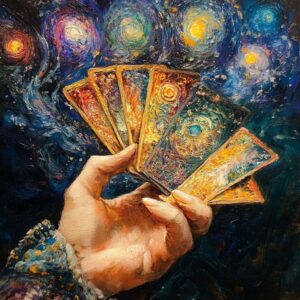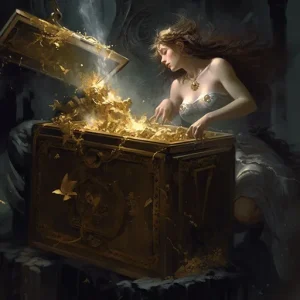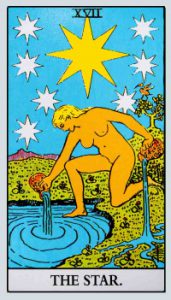
In Greek mythology, Pandora was the first woman, crafted by Zeus after Prometheus stole the secret of fire from him and gave it to mankind. Angered, Zeus ordered Hephaestus to create a woman as a punishment for humanity. The gods named her Pandora (Pan-dora), meaning "gift of all the gods," because each god bestowed upon her a unique gift. Hephaestus shaped her from clay, giving her form; Aphrodite granted her beauty; Apollo gifted her musical talent and the ability to heal. Finally, Zeus gave her a box, instructing her never to open it, thus bestowing upon her the gift of curiosity. Despite the warnings of his brother Epimetheus to avoid accepting gifts from the gods, Prometheus fell in love with Pandora and married her.

In those days, humans lived in a perfect world without worries, but that was about to change. Zeus had warned Pandora not to open the box, but one day, curiosity got the better of her, and she opened it. The moment the box was opened, all the calamities of the world—sorrow, poverty, crime, death, diseases, and all the evils of humanity—were released into the world. In a panic, Pandora quickly closed the box. Suddenly, she heard knocking on the lid and a clear voice asked her to open the box, but Pandora was afraid and refused. After much persuasion, she finally agreed, reasoning that one more disaster wouldn't make the world, already bleak and sad, any worse. When Pandora opened the box again, she released hope into the world.
Greek mythology often served to explain the world, nature, and the events that occur. This story sought to explain the origin of the world's disasters and the source of hope that emerges despite them.
Pandora's story is reminiscent of the tale of Eve and the forbidden fruit in the Garden of Eden, as mentioned in the Torah. God created Eve and gave her to Adam. The serpent tempted Eve to eat from the one tree that was forbidden to her, the Tree of Knowledge of Good and Evil. As a result, Adam and Eve were expelled from the Garden of Eden, which was a perfect world. The punishment for Adam was to toil by the sweat of his brow to bring forth bread from the earth, and for the woman, it was said that she would give birth in pain.
For historical accuracy, when Erasmus of Rotterdam translated the story of Pandora into Latin, he mistakenly replaced the jar with a box. The term "Pandora's Box" has since become an idiom, meaning that once the metaphorical box is opened, it unleashes problems, troubles, and other misfortunes.

The card represents the stage where the master discovers the spring of youth, a simple and clear place without complications that exist in purity, innocence, happiness and hope. Which is an important source of energy that allows a person to regenerate, to be cleansed. The quear returns man to the childhood ability before losing adolescence, the ability to be who is uninterrupted or influence of past memories and fears. This source of energy is called love. When a person is injured, he closed and contacted the pain and suffering, but together with them the hope was buried. This is a stage in the journey where the walls that exist in his life and were built to protect himself from pain and difficulties. The Master is released from the blocking walls to deal with the same pain and difficulties that have been established in the first place. He must open his personal Pandora box to remove the walls, only then can he reconnect to the love energy.
The card represents the positive forces available in man. Tarot card of hope, optimism, love, happiness and success. A card of innocence, honesty and purity. The questioner doesn't hide anything and has nothing to hide. His life is clean and simple.

Orit Raphael, Tarot Reader for Personal Guidance, Insights, and Messages